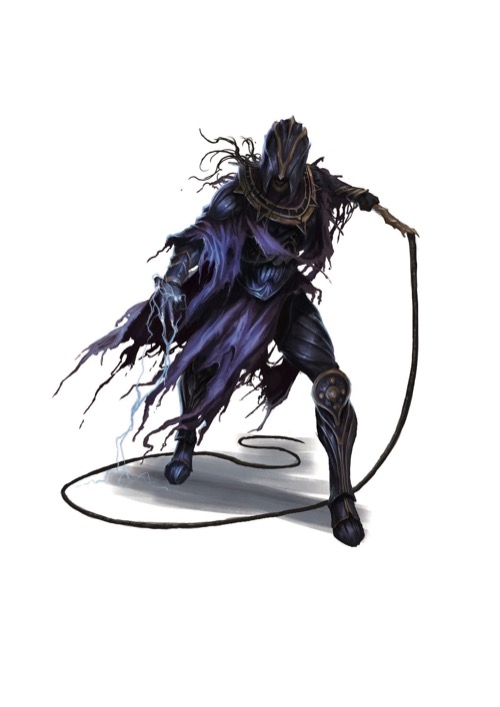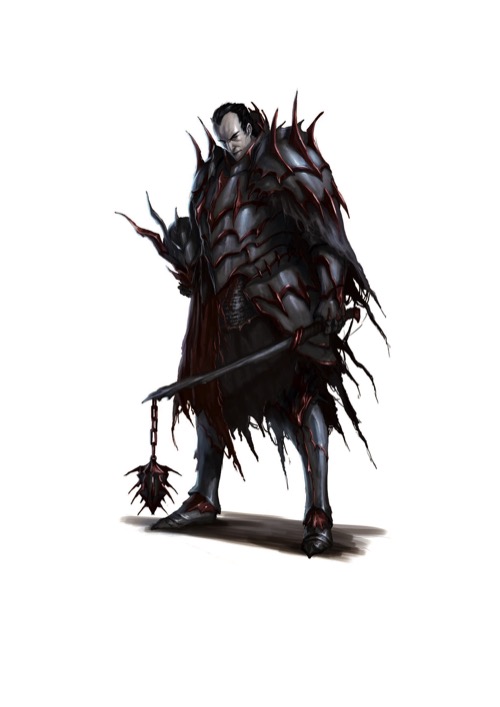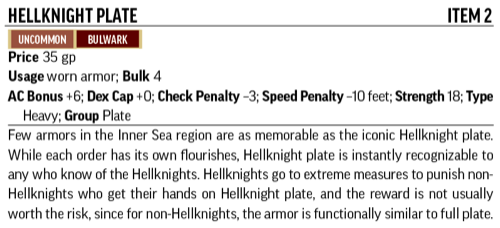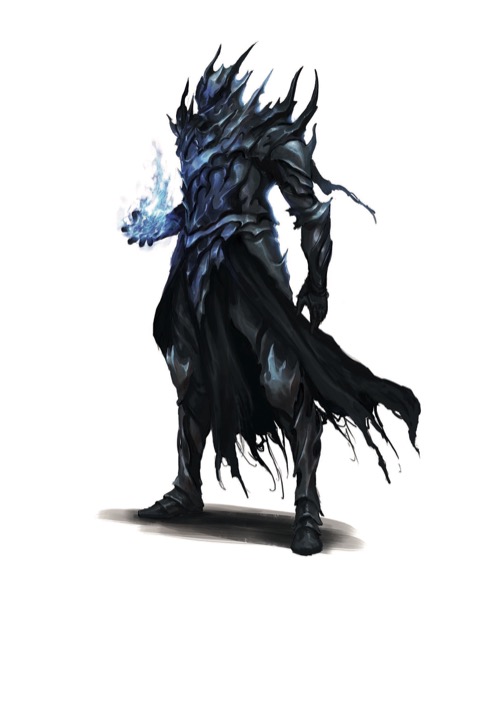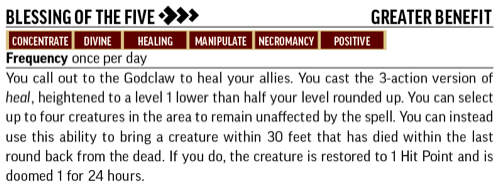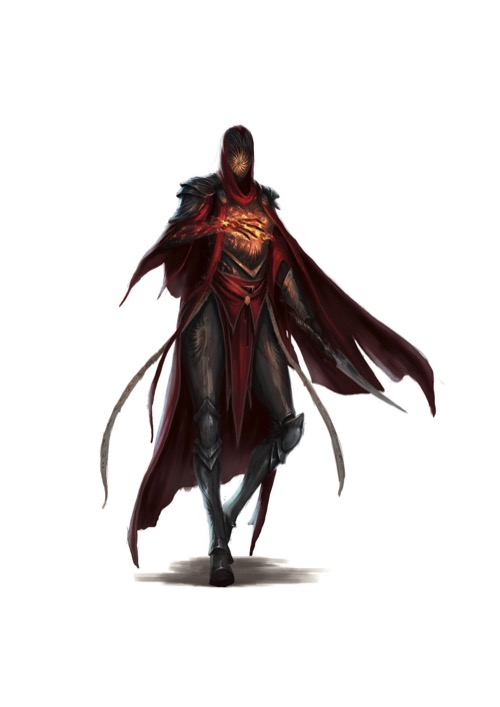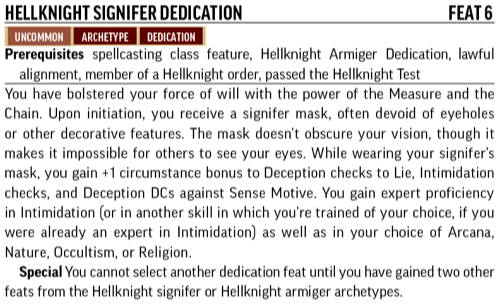Last week, we took our first big look at the Firebrands, a brand new organization premiering in the Lost Omens Character Guide (releasing in just a few weeks!). While new organizations are fun, people familiar with the Age of Lost Omens will have lots of classics to look forward to as well. Pathfinder has had plenty of iconic figures throughout its history including our iconic characters like Seelah and Valeros, as well as the Gray Maidens that featured on the back of the original Core Rulebook. Among some of these more memorable figures are the Hellknights, the imposing paragons of law.
The Hellknights are a widespread organization that spans the Inner Sea region, though many of its orders are located within Cheliax. At its core, the organization is dedicated to enforcing and upholding law and order. The Hellknights believe the letter of the law to be absolute and understand that without a commitment to law, the world is under threat of succumbing to the terrors of chaos and disorder.
Hellknights follow a massive set of laws and virtues known as the Measure and the Chain. The Measure collects all of the countless laws and strictures that make up the Hellknights’ code. These laws take inspiration from the structure and order of Hell itself, with many Hellknights seeing the order of Hell as something to aspire to and emulate. The Chain presents the Hellknights’ most important virtues: order, discipline, and mercilessness. Keeping these ideals in mind, the Hellknights seek out lawbreakers and those who threaten the stability of order, punishing them to the utmost extent of the law regardless of the crimes committed. Compassion of any kind leads to anarchy and, as all are guilty of some infraction, no mercy shall be spared for those who break the law.
Characters who want to become Hellknights will have to undergo rigorous training to even be considered for entrance into the Hellknights. This training is represented in the form of the Hellknight armiger archetype, originally found in the Lost Omens World Guide. Since every Hellknight has to be an armiger first, it’s a very important archetype for would-be Hellknights. In fact, it’s so important that we decided to expand on the archetype just a bit by providing new feats to support it! Once you go through the process of becoming an armiger, you are faced with the Hellknight Test in which you fight a devil in one on one combat. Succeed and you become a full-fledged Hellknight. Fail and you die. Pretty simple. Once you become a Hellknight, you have access to the Hellknight’s signature armor!
The Hellknights are not a monolith. Though every Hellknight follows the Measure and the Chain, the organization is broken into several orders, each of which have a different focus. The Order of the Chain (who were the stars of a recent piece of fiction by Liane Merciel) are dedicated to tracking down criminals who have eluded the hand of the law, at least for the moment. The Order of the Pyre instead focuses on rooting out religions, philosophies, and scientific endeavors that could disrupt the status quo. The Hellknights have seven major orders, which are detailed in the book as well as several smaller orders that feature brief descriptions.
Characters that become members of the Hellknights must join one of these orders in order to become a full-fledged Hellknight. Because each order has a distinctive focus, we wanted to provide options to characters that better represent their affiliation with their respective orders. To that end, we created a new set of feats, Order Training and Advanced Order Training, to allow Hellknight characters to gain unique abilities that are only available to their order. Both of these feats are available to Hellknights, Hellknight Signifers, and Hellknight armigers, so you can access these abilities regardless of where you are along your career path. The Order Training feat gives you lesser abilities, like the Order of the Nail’s ability to ignore non-magical difficult terrain, while the Advanced Order Training gives greater power, like the blessing available to members of the Order of the Godclaw.
Unfortunately, we only had enough space to get order abilities for the seven major orders. If and when we get a chance to look at the Hellknights again (maybe in a book focused on Old Cheliax? Who knows! Let us know if you want that!) we will get a chance to expand further on the orders and provide new options. In addition to the above options, the book provides details on the various ranks among the Hellknights, such as Maralictor and Paralictor, as well as information on the Lictors of each of the Hellknight orders. Of course, I would be remiss if I didn’t mention one of the biggest options available in this book: the Hellknight and Hellknight signifier archetypes!
Building off of the Hellknight armiger archetype, these two archetypes allow Hellknight characters to reach their full potential. Hellknights are fierce warriors clad in Hellknight armor and bringing about brutal justice wherever they go. Hellknights are the big, tough combatants among the organization and have different abilities to represent that, like the scaling of their proficiency in Hellknight plate and attacks like the Blade of Law.
Hellknight signifers on the other hand are more focused on spellcasting. They typically provide support to other Hellknights on the battlefield, but are no less dangerous and dedicated than their fellow Hellknights. Signifers wear unique masks that in addition to being quite intimidating, also grant unique abilities. For example, with the Signifer’s Sigh feat you gain darkvision and lessen the effects of being dazzled, while Gaze of Veracity feat allows you to cast glimpse the truth as a focus spell.
If you’re looking to learn more about the Hellknights or even consider joining their ranks, make sure to read Amanda Hamon’s work in the Lost Omens Character Guide. If you like the idea of playing a knight, but prefer to focus more on saving the day and helping others rather than just brutally upholding the law, consider checking out our preview of the Knights of Lastwall next week! Either way, make sure to check out the Lost Omens Character Guide when it releases on October 16th. It’s a Hell of a treat!
Luis Loza
Developer
Hellknights on the Town
Friday, September 20, 2019

